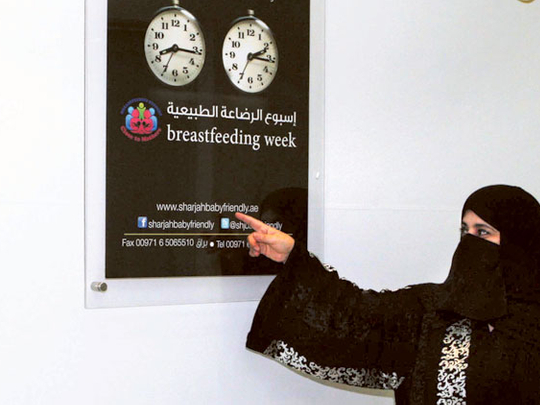
Sharjah: With statistics showing that over 200,000 child lives could be saved annually around the world through breastfeeding, Sharjah is moving towards becoming a baby-friendly city.
The World Health Organisation (WHO) claims that only breastfeeding for the first six months of a child’s life, and up to two years of age would save about 220,000 children worldwide.
Determined to promote breastfeeding culture in Sharjah, the Sharjah Baby-Friendly Campaign (SBFC), which was launched by Shaikha Bodour Bint Sultan Al Qasimi, Chairperson of the Sharjah Investment and Development Authority, in 2012, aims to transform the emirate into a baby-friendly city by empowering mothers to breastfeed with the support of health facilities and the community.
Initially focusing on hospitals and health-care centres in its first phase, the campaign has extended its plans to target public places such as museums, malls and parks, along with nurseries, and workplaces across the emirate.
“Over 90 per cent of all staff in government hospitals and health centres have been trained though this campaign on how to promote breastfeeding among mothers and spread awareness,” Dr Hessa Al Ghazal, director of the Maternal and Child Health Centre in Sharjah, and executive director of Sharjah Baby-Friendly Campaign told Gulf News.
The initiative, which is the first of its kind in the country, was approved by His Highness Dr Shaikh Sultan Bin Mohammad Al Qasimi, Supreme Council Member and Ruler of Sharjah, through the issuing of a decree in 2011.
Based on the WHO and Unicef International Baby-Friendly Hospital Initiative (BFHI) launched in 1991, the SBFC aims to help government hospitals and health centres in Sharjah achieve full international accreditation. “So far, two out of five government local hospitals including one in Sharjah and one in Khor Fakkan, have been given full accreditation by the WHO and Unicef as 100 per cent baby-friendly hospitals,” said Dr Hessa.
International accreditation was also given to one out of 22 health clinics in the emirate, explained Dr Hessa, who added that over 50 per cent of all health facilities are in the final stages of receiving the accreditation.
Expanding the campaign from focusing on health facilities to other aspects of the community, Dr Hessa pointed out that mothers should continue receiving support and awareness about breastfeeding even after they leave the hospital.
“Mothers usually leave after one or two days after giving birth so the support they receive at the hospital should continue at the health centres where they have their follow-up appointments,” Dr Hessa said.
With all health facilities in the emirate registered at the SBFC, the environment for mothers has been transformed to welcome the practice of breastfeeding. “Breastfeeding has been encouraged since the UAE signed an international agreement with WHO and Unicef to prevent all marketing and advertising of milk substitutes and formulas in health facilities in the country,” said Dr Hessa.
Along with spreading awareness about the benefits of breast milk and hazards of artificial milk through posters and brochures, the campaign has also worked with public places such as malls, museums, clubs, and parks to provide a mothers’ room for breastfeeding.
“It is a challenge for a lot of mothers to leave the house with a baby if they know they will not be able to breastfeed,” said Dr Hessa, who added that the public service is becoming more common in Sharjah.
Many mothers also face difficulties in going back to work after giving birth as they are forced to resort to artificial milk. “Having mothers’ rooms or nurseries at the workplace gives mothers a place to express their milk or breastfeed,” she said, adding that governmental workplaces have already adopted the idea.
“We are hoping that more government and private companies work with us to achieve the goal of making Sharjah a baby-friendly city,” she said.












